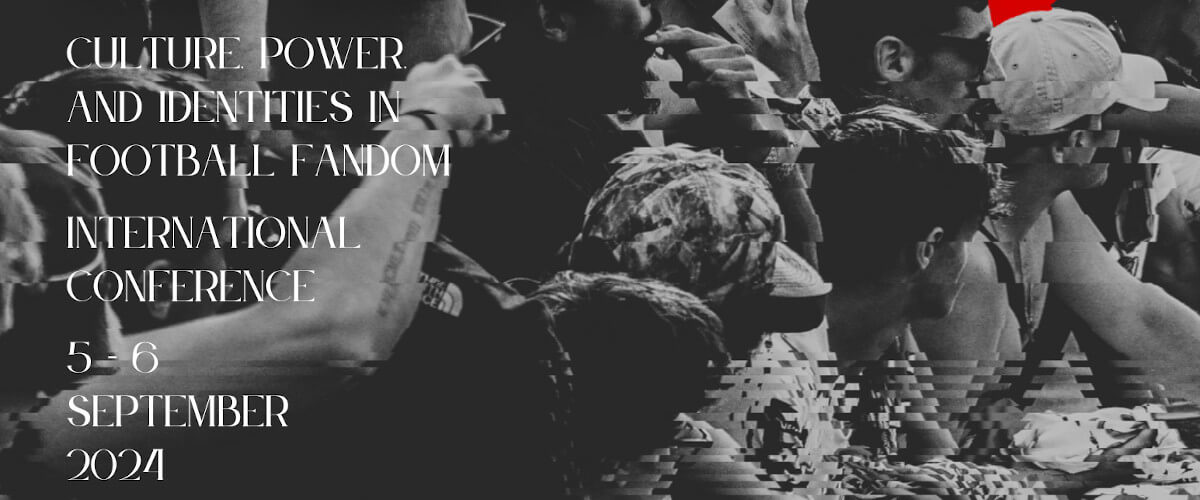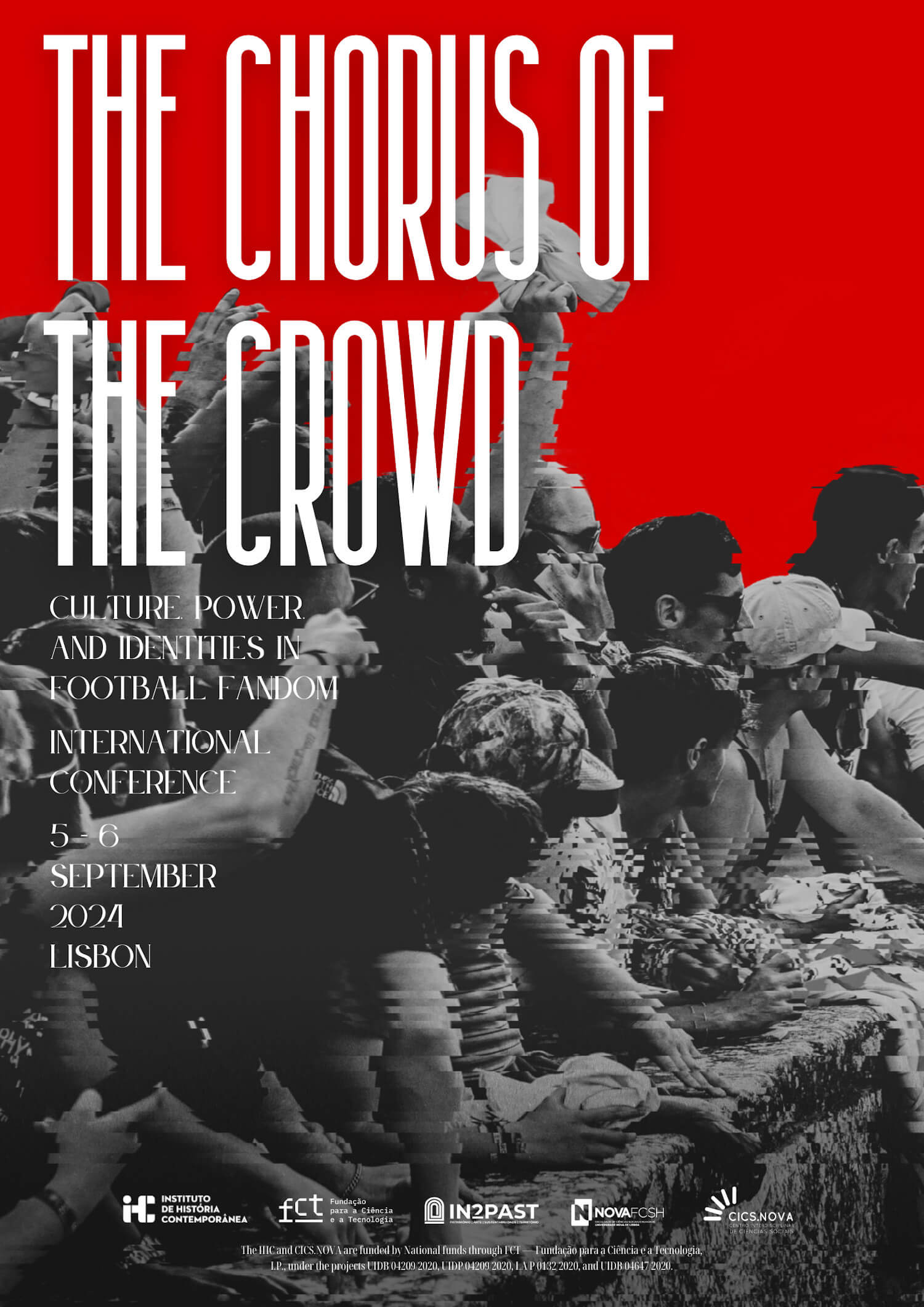setembro, 2024

Detalhes do Evento
Conference that aims to promote a dynamic, interdisciplinary, and revitalized discussion on football fandom and supporter culture. The Chorus of the Crowd: Culture, Power, and Identities in Football
Ver mais
Detalhes do Evento
Conference that aims to promote a dynamic, interdisciplinary, and revitalized discussion on football fandom and supporter culture.
The Chorus of the Crowd:
Culture, Power, and Identities in Football Fandom
Framework
Football fan cultures have developed in tandem with the massification and organization of football, responding to various ideas, aesthetics, and attitudes that are shaped by the particularities of historical, social, and cultural contexts. As one of the largest ongoing global social movements, football fandom blends individual and collective performances, thereby shaping identities and fostering a sense of belonging. It simultaneously assumes an omnipresent role within modern societies, especially in urban and public/semi-public spaces.
This conference arises from the desire to promote a dynamic, interdisciplinary, and revitalized discussion on football fandom and supporter culture. The objective is not merely to share case studies that deepen our understanding of these social practices, but also to reflect on the intricate ways in which they interact with various aspects of the contemporary world. By shifting our initial analytical focus to fans’ commitment and involvement with and/or within their clubs, we can gain a fresh perspective on what we can perceive as the constitutive processes of contemporary communities.
With this in mind, we are prioritizing three thematic lines for this conference: a) Football Fans, Political Institutions, and Social Organizations: the study of how supporters relate to and interact with clubs as political and social institutions, with special attention to symbolic disputes and negotiated power dynamics; b) Virtues, Beliefs, Values, and Supporters’ Lifeworld: the analysis of the connections and networks that tie football fans/supporter cultures to specific political, social, and/or religious virtues, beliefs, or values; and c) Classifications, Categorizations, and Representations of Football Fandom: the research into how different institutions and organizations, along with their knowledge production, institutional practices, and cultivated discourses have influenced or been involved in classifying, defining, and even transforming football fan cultures and landscapes throughout history.
Keynote speakers
Anastassia Tsoukala (Université Paris-Saclay)
Christian Bromberger (Aix-Marseille Université)
Attendance
We will be hosting 30 papers from several researchers from all parts of the world and two keynote speeches from fundamental scholars during the span of two days — 5 and 6 September, in Lisbon. We will divide our hybrid format program between the Campolide Campus (NOVA FCSH) and SL Benfica Museum. Entrance for the general public is free and does not require mandatory registration when at Campolide Campus (all day 5 September and the morning of 6 September). However, if you wish to attend the sessions and the final keynote speech held at SL Benfica Museum (afternoon of 6 September), please fill out this 🔗 brief form. If you also want to receive a link prior to the conference for private ZOOM access (only available for the NOVA FCSH/Campolide Campus sessions), please fill out the form as well.
If you need more clarification or have other questions, please contact us at: footballfandom.conference2024@gmail.com.
We anticipate that this conference will provide an opportunity to bring together scholars, junior researchers, and sports history enthusiasts, creating a vibrant platform for learning, knowledge sharing, and collaboration. Join the crowd and participate!
Call for papers
Football fan cultures have developed in tandem with the massification and organization of football, responding to various ideas, aesthetics, and attitudes that are shaped by the particularities of historical, social, or cultural contexts. As one of the largest continuing global social movements, football fandom blends individual and collective performances, thereby shaping identities and fostering a sense of belonging, while simultaneously assuming an omnipresent role within modern societies as a whole, but particularly in the urban and public/semi-public spaces.
Since the 1980s, a series of critical incidents prompted governments and, subsequently, researchers to scrutinize the practices of football fans. This scrutiny has led to a body of literature that has systematized its perspectives into four key areas of focus:
- An analysis of fan cultures as organized collectives, encompassing an exploration of the associated violence;
- A study of cultural expressions originating from fans and the social construction of taxonomies that categorize these fan subcultures;
- Research observing the relationships between fans, commodification of sports, globalization, and consumption within the framework of the capitalist and/or neo-liberal economic model;
- An examination of the connections between football fan cultures and several socio-political categories, with particular emphasis on nationalism and masculinity.
This conference arises from the desire to promote a dynamic, interdisciplinary, and revitalized discussion on football fandom and supporter culture. The objective is not merely to share case studies deepening our understanding of these social practices already outlined into the advocated four key areas of focus, but also to reflect on the intricate ways in which they interact with various aspects of the current world. Shifting our initial analytical focus to fans’ commitment and involvement with their clubs can offer a fresh perspective on what we can perceive as the constitutive processes of contemporary communities. With this in mind, we propose prioritizing three thematic lines for this conference:
- Football Fans, Political Institutions, and Social Organizations: the study of how supporters relate to and interact with clubs as political and social institutions, with special attention to symbolic disputes and negotiated power dynamics. This may include likewise the inquiry of the associations between supporters, football governance and leaderships (and their styles, modes of legitimation, etc.), but also the modes of participation, resistance, activism, and community building as response to on-going disputes;
- Virtues, Beliefs, Values, and Supporters’ Lifeworld: the analysis of the connections and networks that tie football fans/supporter cultures to specific political, social, and/or religious virtues, beliefs, or values. Moreover, this might comprise the exploration of the links concerning fandom, history and collective memory. Thus, for example, the stories football fans like to tell about themselves as devotees of a certain club or even the narratives of social recognition that are built by diverse supporter groups within each club can help us expand our understanding of the previously mentioned connections.
- Classifications, Categorizations, and Representations of Football Fandom: the research into how different institutions and organizations (such as the state, businesses, or media, and some of which are yet to be mapped), along with their knowledge production, institutional practices, and cultivated discourses have influenced or been involved in classifying, defining, and even transforming football fan cultures and landscapes throughout history. This could additionally embrace studies that aim to establish connections between the proposed thematic line and topics such like gender relations, as well as venues and atmospheres.
We believe that encouraging contributions from diverse research fields allows for a comprehensive understanding of this multifaceted phenomenon. This approach extends beyond fringe experiences, such as hooliganism, to embrace everyday fan practices, supporters’ performances, and their subjectivities in historical perspective. Therefore, we invite interested applicants to submit their proposals contemplating at least one of the aforementioned thematic lines.
We also anticipate that this conference will provide an opportunity to bring together scholars, junior researchers, and sports history enthusiasts, creating a vibrant platform for learning, knowledge sharing, and collaboration.
Please submit a Word document with a title and a 500-word abstract (maximum), along with a brief biographical note. The call for submissions will be open from 28 December 2023 to 28 March 2024. Accepted papers should then aim for a 20-minute presentation. Notification of accepted submissions (and other relevant information) will be announced by the end of May 2024. The final conference program is expected to be fully disclosed in June 2024. The publication of a special issue in a peer-reviewed journal is also planned after the conference.
The event is scheduled to span two days, specifically on 5 and 6 September 2024, in Lisbon, Portugal. Our conference will embrace a hybrid format, offering sessions both in-person and online; nevertheless, emphasizing our event’s collaborative spirit, we strongly encourage your on-site participation. The working language will be English. To submit abstracts and for any questions, please send an e-mail to: footballfandom.conference2024@gmail.com.
>> Download the call for papers (PDF) <<
Organizing and Coordination Team
Rahul Kumar (Institute of Contemporary History — NOVA School of Social Sciences and Humanities / IN2PAST)
João Sedas Nunes (CICS.NOVA – Interdisciplinary Centre of Social Sciences — NOVA School of Social Sciences and Humanities)
Gil Gonçalves (Institute of Contemporary History — NOVA School of Social Sciences and Humanities / IN2PAST)
Daniel Freire Santos (Institute of Contemporary History — NOVA School of Social Sciences and Humanities / IN2PAST)
Carolina Nascimento de Oliveira (History Territories Communities — NOVA School of Social Sciences and Humanities Hub of the Centre for Functional Ecology)
Iara Sobral (School of Arts and Humanities of the University of Lisbon)
Tempo
5 (Quinta-feira) 9:00 am - 6 (Sexta-feira) 7:00 pm
Localização
NOVA FCSH, Almada Negreiros College, Auditorium 224
NOVA's Campolide Campus — 1099-085 Lisbon
Organizador
Institute of Contemporary History and CICS.NOVA — NOVA School of Social Sciences and Humanities

